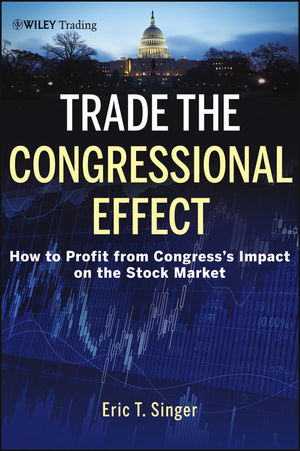 The first to document the general effect of Congress on daily stock prices, Eric T. Singer, manages the Congressional Effect Fund (CEFFX), begun in 2008. His new book, “TRADE THE CONGRESSIONAL EFFECT: How to Profit from Congress’s Impact on the Stock Market” (Wiley, October 2012) brings his insights and strategies to the individual investor.
The first to document the general effect of Congress on daily stock prices, Eric T. Singer, manages the Congressional Effect Fund (CEFFX), begun in 2008. His new book, “TRADE THE CONGRESSIONAL EFFECT: How to Profit from Congress’s Impact on the Stock Market” (Wiley, October 2012) brings his insights and strategies to the individual investor.Did you know that on average on a daily basis, Congress hurts the portfolios of almost every American every day?
What is the Congressional Effect? When Congress is in session, there is a negative effect on equities markets. Based on solid historical research, the statistics prove the validity of the Congressional Effect.
— From 1965 through 2011, on the 7,900 days Congress was in session, the stock market went up in price less than 1% annually.
— During the same period, on the 4,100 days they were on vacation, the stock market went up over 16% annually.
— Statistically, the data is identical going back to 1897 day by day. $1 invested only on in session days from 1897 through 2011 would have compounded by price action into just $2. $1 invested just on vacation days would have compounded into over $300 in 115 years..
A financial professional, with more than 25 years of experience and an expert on this phenomenon, Singer and TRADE THE CONGRESSIONAL EFFECT recommend strategies for how to optimize your portfolio by explaining this effect. By understanding the incentives that each politician proposes (which collectively results in Congress relentlessly working against your portfolio) you can better use their efforts to your advantage. Some examples include:
— Think long term when Congress thinks short term. Value investing funds, for example, typically adopt a long term view, and tend to avoid some of Congress’s short term damage.
— Invest when the pain caused by Congress for an industry is at its peak. Avoid industries about to be shoved under the Congressional bus.
— Side step Congress altogether by only investing on the days Congress is out of session. This is what the Congressional Effect Fund does, and since its inception in 2008, it has been within about 1.5% annually of the S&P 500 in performance with about half the risk as measured by volatility and a quarter of the correlation making it a relatively safe investment.
Eric Singer can also answer:
— Why does the Congressional Effect happen?
— How does Behavioral Finance explain Congressional behavior?
— Who is better for the stock market, Democrats or Republicans?
— What are some of the special things to pay attention to as we come the end of the election cycle?
— What changes can be made to improve Congress?
Eric Singer manages the Congressional Effect Fund, traded under the symbol CEFFX (CEFIX for institutional investors). A public mutual fund launch in 2008 through his registered investment advisor, Congressional Effect Management, LLC (www.congressionaleffect.com). He was the first to document the general effect of Congress on daily stock prices in an article published in Barron’s in 1992. His opinion pieces have appeared in Investor’s Business Daily as well as Forbes, American Spectator, American Thinker, Townhall, Seeking Alpha, and Newsmax. He has been featured on national TV and radio, including Fox Business News and Bloomberg TV.
